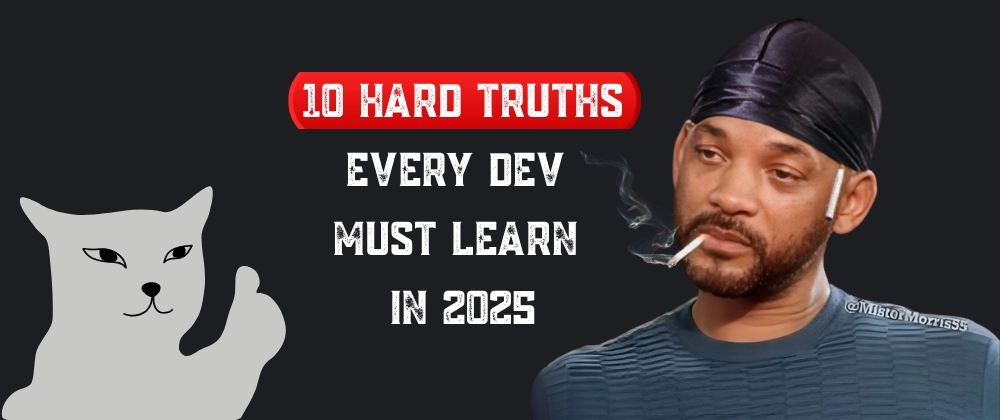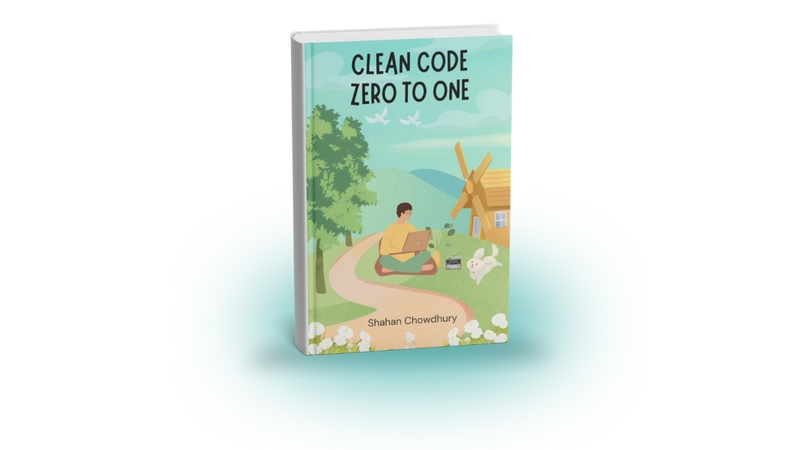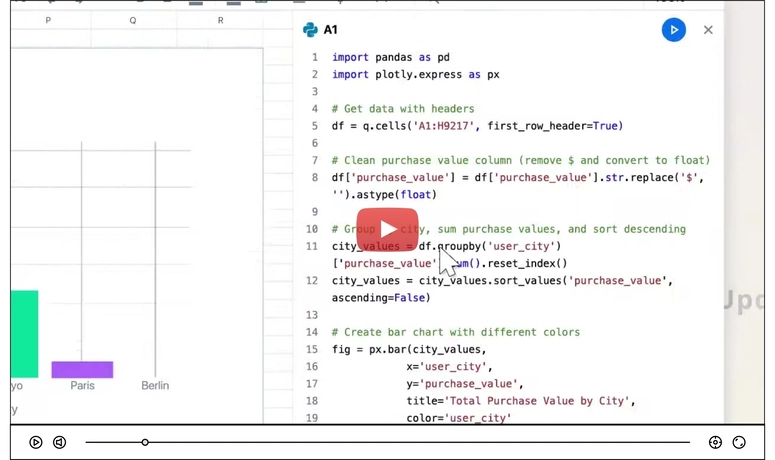I've been in the coding game for 5 years.
Written messy code.
Struggled with debugging nightmares.
Made dumb mistakes.
Learned the hard way.
Here are the cold, hard lessons I had to learn the hard way (every developer must learn)...
1. Looks help but they’re not everything.
I remember when I first started using AI code assistants. I thought once I had them, coding would be effortless.
They provided suggestions, completed lines... but my projects still had issues. Because I still lacked the understanding of clean code principles. AI tools got me started, but my lack of foundational knowledge closed doors just as fast.
What I learned is this: AI tools don’t just respond to what you input; they amplify your existing coding habits. A developer who codes with clarity, who structures functions with purpose, who doesn’t rely solely on AI -- that developer will outperform someone who blindly follows AI suggestions every time.
2. If you’re always chasing, you’re not in control.
This one stung. I used to think effort was everything. If I just kept tweaking and adding features, the code would improve. So, I’d refactor endlessly, integrate every new library, follow every trend... and I ended up with bloated, unmanageable codebases.
Because when you’re doing 90% of the work without a clear direction, you’re not developing; you’re floundering. Real progress is intentional. If a feature truly adds value, it will integrate seamlessly. Stop chasing every new tool or framework that barely fits your project. Start valuing simplicity and purpose.
3. Your purpose is more attractive than your tools.
I had phases where I’d focus all my energy on mastering the latest coding tools. Everything revolved around having the newest gadgets in my developer toolkit. I’d spend hours customizing my IDE, setting up complex workflows... and I got nowhere.
But when I locked in on my goals—building meaningful projects, solving real problems—when I was too busy creating to constantly tweak my setup, suddenly my work stood out.
Clients and peers would say, “You’re different,” “You’re focused,” “You’ve got something going.” That’s when I realized: developers who chase purpose attract recognition without even trying. Because that energy is rare, and people feel it.
4. I’ve learned to stop coding so much.
Early on, I thought I had to prove myself. I’d over-engineer. Add unnecessary complexity. Implement features no one asked for. It came off as overcompensation and it killed project momentum.
I started studying minimalism in code, the beauty of simplicity. I realized users notice everything.
The way an application flows. The intuitiveness of the interface. The speed of execution. A developer who can deliver powerful functionality with clean, simple code is a developer who gets attention. Simplicity is power. Let your code speak for itself.
5. Your past code matters.
I worked on projects where I ignored my previous mistakes—spaghetti code, lack of documentation, poor structure — and I told myself, “I’ll do better next time.” I wanted to move forward without addressing the past. I couldn’t. I became trapped in a cycle of repeating errors.
A developer’s past work is a preview of their future. It doesn’t mean you have to be perfect, but you do need accountability. You need to learn and grow. If all your past projects were chaotic, ask why you approached them that way. If you consistently avoided testing and documentation, ask what that means for your development process.
Don’t ignore the signs just because you’re eager to move on.
6. Not every tool is worth your time.
When I was younger, I treated every new framework or library as a must-learn. If it was popular, that was enough. I’d ignore its relevance to my work, its learning curve, its community support—just to have it on my resume. I paid for it every time.
Now? I care more about effectiveness than trendiness.
Does this tool solve a problem I have? Does it integrate well with my existing stack? Does it have long-term viability? If it’s just trendy but brings nothing substantial, I pass. My time is valuable. My focus is sacred. And not every tool deserves attention.
7. The less you rely, the better things go.
This doesn’t mean rejecting help or tools. It means independence. I used to depend heavily on AI code assistants. Let them dictate my coding style. Follow their suggestions blindly. But when I stopped relying so much—when I focused on understanding, improving, and staying grounded—things shifted.
My code became cleaner. My problem-solving skills sharpened. And ironically, that’s what made me a better developer. The one who can code without assistance holds the power. Not out of arrogance but out of competence.
Clean code isn’t optional... it’s your edge. AI can’t fix chaos. If your code is unreadable, your future’s unstable. I learned the hard way. You don’t have to. Grab my book "Clean Code Zero to One" on Gumroad and level up forever:
📘: https://codewithshahan.gumroad.com/l/cleancode-zero-to-one
8. Being a “yes developer” doesn’t work.
I used to think agreeing to every feature request was the way to please clients. I’d say yes to everything, avoid pushing back, always accommodate. It made me overworked.
Even worse—it made me look unprofessional.
Clients don’t want a pushover. They want a professional with a backbone. Someone who sets boundaries. Someone who’s accommodating but not afraid to say no. Someone who makes informed decisions.
Be a good developer but don’t be a submissive one. There’s a difference.
9. Comments are cool, but clarity is better.
“// This function calculates the sum.” Blah, blah, blah. Every developer writes that. But the one who names the function calculateSum()... who structures code so its purpose is self-evident... who doesn’t rely on excessive comments to explain convoluted logic—that’s the developer whose code is respected.
Clarity isn’t verbose. It’s in the structure, the naming, the organization. I stopped trying to explain my code with comments and started writing code that needed no explanation. That’s when my work became exemplary.
10. Your project should add to your life, not be your life.
I’ve taken on projects where I lost myself. I stopped learning new skills. Stopped networking. Stopped pursuing personal growth. And every time, it ended with regret.
That's all for today. Hope you learned something new. Feel free to follow me and subscribe to my weekly horsecoder newsletter for the latest updates.
🏖️ This article is sponsored by FN Tech Solution, where you can find people to do marketing for you: create apps/websites/designs, grow your business, and more.
🌱🗃️ More Learning Resources:
📘 My Book: Clean Code Zero to One
📹 YouTube: Programming with Shahan
🩻 𝕏: shahancd
🌐 Website: codewithshahan.com





Top comments (8)
I could relate to some of the points. Especially loved the second point about Chasing new stuff and
I’ve learned to stop coding so much. Code things that matter to you :)Yeah.. that wasted a lot of my time.
Hard truths only
Yes.
Ouk thanks
As someone who’s ~4 years into his journey I relate to a few of these. I’m also starting to realise my areas of focus instead of chasing the latest trends and brining it back to “make it work” and just getting it done.
Learning foundational stuff hit so hard as I recently had that battle with OAuth and not understanding it foundationally I used the latest libraries and couldn’t understand what was going wrong. Finally took a step back and did the ground work and so glad I did.
Also I love Ai but I also get super annoyed by it, sometimes it just gets in the way of development and growth so I try to use it sparingly.
I’ve looked back on my previous projects and thought damn I had no idea what I was coding but I saw my growth.
Thanks for sharing
You learned the difference between programming and software engineering
做一个“唯唯诺诺的开发者”是行不通的。 -- 唯唯诺诺日常
Some comments may only be visible to logged-in visitors. Sign in to view all comments.